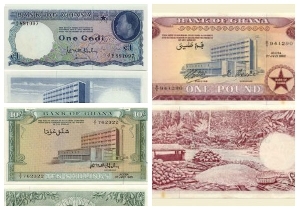From Cowries to Cedis: How Ghana’s currency has changed over the years

Ghana at the present has adopted the cedi notes and coins as its legal tender
Some few years after Ghana gained independence from British colonial rule, the country adopted the cedi notes and pesewa coins to replace the Ghana pounds; shillings and pence, on July 19, 1965.
Prior to this, the West African Currency Board was first adopted and used mainly for trading purposes across the sub-region in the early 1940s, all through to 1954.
Ghana at the present has adopted the cedi notes and coins as its legal tender.
But how did the country achieve this feat over the years?
In 1957, Ghana made the decision to formally leave the British Colonial Monetary System and adopt the widely accepted decimal system.
The newly-adopted cedi notes and pesewa coins at the time were equivalent to eight shillings and four pence (8s 4p) and bore the portrait of the country’s first president, Dr. Kwame Nkrumah.
The name ‘cedi’ was however derived from the Akan word ‘sedie’ meaning cowrie – a shell form of currency that gained popularity and wider circulation in the later part of the 19th century.
The ‘pesewa’ on the hand represented the smallest denomination of the gold-dust currency regime and its name was chosen to replace the British colonial penny.
The host of People & Places on GhanaWeb TV, Wonder Ami Hagan, got access, in 2022, to the newly-refurbished Ghana National Museum, which had specimen of currency notes from the colonial period to date.
A tour guide at the museum recounted that during independence, Ghana had its own currency which has since changed in phases until July 1, 2007, when the last currency was redenominated and changed by the John Agyekum Kufuor administration adpoting the mantra “the value will be the same”.
While some still argue on whether the cedi re-denomination indeed ensured its value remained the same, some analysts have said the move rather put the local currency back against the US Dollar.
The redenomination meant that about that ten thousand cedis is now equivalent to one Ghana cedi.
The government and the Bank of Ghana at the time said the re-denomination was due to the increasing difficulty in maintaining accounting and statistical records.
It further associated problems with accounting and data processing software as part of its reasons for the move.
Source: www.ghanaweb.com





